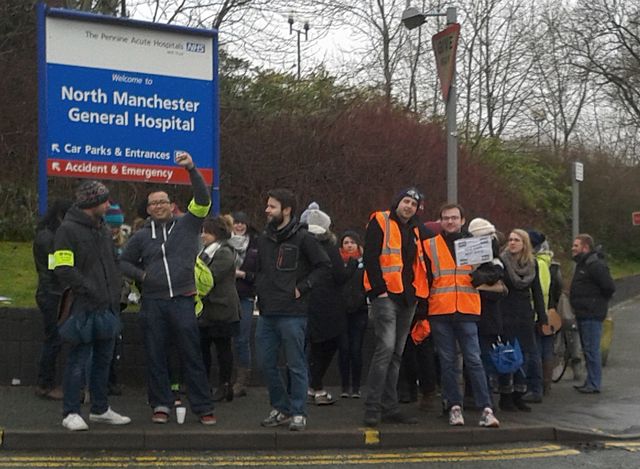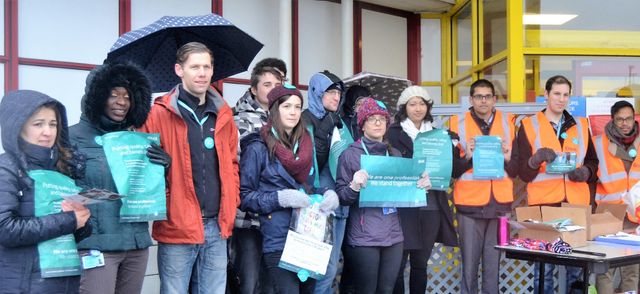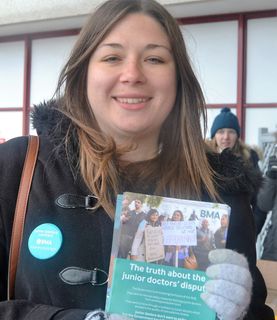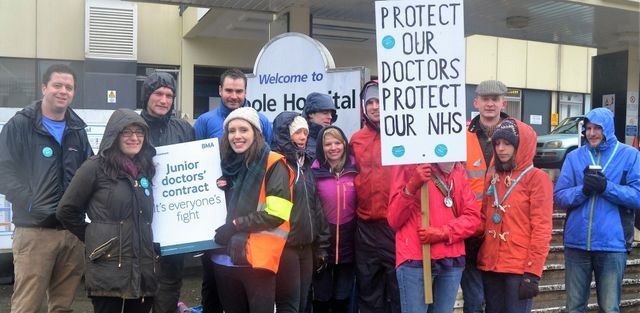Robert Stevens
Junior doctors throughout England ended a 48-hour strike Thursday. The strike was the latest in the doctors’ ongoing dispute with the government, which last month imposed an inferior contract on them. Thousands of doctors participated in picket lines in many towns and cities, despite continuous heavy rain and wind.
 The picket line at North Manchester General Hospital
The picket line at North Manchester General Hospital
The contract is set to be enforced in August and means cuts in premium rate pay for out-of-hours work, evenings and weekends. The already notoriously long working hours of doctors could be increased in a move detrimental to their health and the wellbeing of patients.
The strike, called by the British Medical Association (BMA), the registered trade union for doctors, began Wednesday at 8 a.m. and over the two days resulted in more than 5,000 operations and procedures across England being cancelled. The stoppage was organised to allow emergency coverage only. Since the dispute began, 19,000 operations have been cancelled due to industrial action that began in January.
 Pickets at the Royal Bournemouth Hospital
Pickets at the Royal Bournemouth Hospital
The struggle by the doctors is widely supported and seen as a stand against the systematic destruction of the National Health Service (NHS) being carried out by the Conservative government. A BBC poll issued this week revealed that 65 percent of those polled support the doctors’ strike. This is an almost identical percentage in support as a poll taken during their last strike held in February.
Another indication of growing support is that the percentage of those opposing the strike fell from 22 percent to 17 percent over the last month.
An Ipsos Mori poll published Thursday for the Health Service Journal found 64 percent of respondents blamed the government for the strike, and just 13 percent blamed the doctors.
Following the decision February 11 by the Tories to unilaterally impose the contract, with the backing of National Health Service England chief executive Simon Stevens, the BMA was forced to call the latest strikes in the face of growing anger from junior doctors. However, opposed to an offensive against the government onslaught, and a call for support from the more than 1 million health workers employed in the NHS, the BMA has restricted action among its own members to three 48-hour strikes to be held over a period of more than six weeks. This week’s strikes are to be followed by others on April 6 and April 26.
Central to its continued isolation of the doctors is the BMA’s launching of a judicial review against the government’s contract. It initiated the review as it called the latest strikes, claiming that the government did not, as required by law, carry out an Equality Impact Assessment (EIA) when it imposed the contract. A judge will now decide on whether Health Secretary Jeremy Hunt acted legally over the contract.
On the part of the BMA, the holding of a judicial review can, depending on the ruling passed, lay the basis for acceptance of the contract. According to aDaily Telegraph report, “The British Medical Association ignored the legal advice of its own lawyers” before launching the review. The lawyers, in advice dated February 19, told the BMA the government’s actions were not “inherently unlawful” and “are likely to pose a considerable drain of the BMA’s internal resources.”
The lawyers, said the Telegraph, “concluded that the judicial review should instead be seen as a ‘last throw of the dice’—with its main potential benefit being a new window of opportunity for the junior doctors’ committee to secure further improvements to the contract about to be imposed. To do this, they suggested, the committee should consider keeping the judicial review secret for one to two weeks, to make it easier for health secretary Jeremy Hunt to reopen negotiations.”
Despite the government directly intervening last month to impose the contract and smash up doctors’ terms and conditions, the BMA has insisted that doctors are not involved in a political struggle. Dr. Bea Bakshi, a member of the BMA’s junior doctor committee, told GP Magazine this week, “I think all options are on the table right now and we have to consider all options to get the government to come back to the table for a negotiated settlement. We need to exert as much pressure as possible on the government to get them to come back and negotiate with us.” She added, “We’re doctors, we don’t play politics. The reason we haven’t escalated to a full walkout right now is because we genuinely don’t want to strike.”
Prior to calling the latest strike and judicial review, Johann Malawana, the BMA junior doctor committee chair, said, “The government must put patients before politics, get back around the table and find a negotiated solution to this dispute.”
As the latest strike began, Malawana appealed to a government hell-bent on defeating the doctors at all costs. “We are facing a Department of Health … driven by politics rather than patients,” he said. “We ask the prime minister [David Cameron] to step in … when we ask to reconsider the imposition of this contact.” World Socialist Web Site reporters spoke to junior doctors on picket lines in a number of towns and cities. The role of the BMA in sowing political confusion was evident in a number of interviews opposing any politicisation of the dispute.
At Hallam University Hospital in Sheffield, Lucy, a junior doctor, said, “It’s a strike for the NHS for our livelihood and our profession. It is not politically motivated. Nobody talks about politics here. … For me it would be great if Hunt resigned and we had someone in power who would listen to us.”
 Fiona
Fiona
Frances said, “I suppose it is a political struggle up to a point. It is not a struggle against any particular party. We had problems under a Labour government as well. They were very, very unhelpful towards the NHS. To put it mildly, yes, it is politics but not party politics.”
Tom said, “We don’t want to play politics; our priority is the patients. The government might want to play politics.”
At Royal Bournemouth Hospital, Fiona, who works in a GP practice, said, “I work in lots of hospitals in the area. We are quite often short of staff and have gaps on rotas. We often have to cross cover and do the work of two or three doctors. … There are not enough nurses, health care assistants and other staff. We see how the budget cuts take their toll. The government wants to further privatise the NHS. We all have to fight if we want to defend the NHS for future generations.”
 Amy
Amy
Amy, a trainee at Poole General Hospital, said, “A 98 percent vote for strike action speaks volumes about how we feel about this substandard contract and defending the NHS. What we really worry about is having a seven-day service provided by five days-worth of doctors.”
At North Manchester General Hospital, Peter, a first year junior doctor, said, “This is an NHS-wide issue. We are the first to be attacked, then they’re coming for the nurses and consultants, it will be a domino effect.
“Doctors are generally from a very conservative background, but we have been forced into this. We are overworked, chronically understaffed and work under tremendous stress. Last week I worked for 59 hours and some days I dread going in. An F1 [first year] like myself recently killed herself in Cornwall, leaving a suicide note that directly implicated Jeremy Hunt. The constant fear of cuts creates terrible anxiety.”
 Pickets at Poole General Hospital
Pickets at Poole General Hospital
Alan, who is training to be an Accident and Emergency consultant, said, “My concern is that if this contract goes through, there will be fundamental changes in the way health care is provided. When I was in medical school tuition fees were £1,500 a year and I left with a debt of £25,000. Today’s students start out with debts of £45,000 upwards, £80,000 to £90,000 if you include loans for living expenses.”
“The government have redefined what anti-social hours means, to include Saturdays. We spend less time with our families now. In fact, there is a 50 percent dropout rate of trainee consultants because of this.
“Capitalism is not compatible with people’s lives. Lots of doctors do locum work [agency] just to get their lives back. The government are hoping to defeat us by dividing NHS workers up.”
Petra, a second year student in general surgery, said, “As a student from the United States, I can compare medical care in the NHS, where everybody is treated, rather than being in a community where you have to fend for yourself. If the NHS is privatised and run for profit only the wealthy who can afford to pay will benefit.”
No comments:
Post a Comment